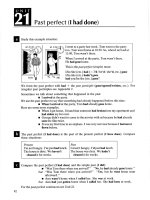TỪ VỰNG TOEIC unit 25
Bạn đang xem bản rút gọn của tài liệu. Xem và tải ngay bản đầy đủ của tài liệu tại đây (261.38 KB, 61 trang )
Unit 25
VERB SIMIL/SIMUL SCEND ONYM SCRIB/SCRIP FALL SOLU HYDR
Greek and Latin Borrowings
Quiz 25-1 Quiz 25-2 Quiz 25-3 Quiz 25-4 Quiz 25-5 Review Quizzes 25
VERB comes from the Latin verbum, meaning “word.” A verb—or action
word—appears in some form in every complete sentence. To express
something verbally—or to verbalize something—is to say it or write it.
verbose
Using more words than are needed; wordy.
• The writing style in government publications has often been both dry and
verbose—a deadly combination.
Americans brought up on fast-paced TV shows and action films have lost any
patience they once had for verbosity. So most American writing is brisk, and
American speakers usually don't waste many words. But many of us love our
own voices and opinions and don't realize we're being verbose until our
listeners start stifling their yawns. And students still try to fill up the pages of
their term papers with unneeded verbosity.
proverb
A brief, often-repeated statement that expresses a
general truth or common observation.
• “Waste not, want not” used to be a favorite proverb in many households.
Proverbs probably appeared with the dawn of language. Sayings such as “A
stitch in time saves nine,” or “Pride goeth before a fall,” or “Least said,
soonest mended,” or “To everything there is a season” are easily memorized
nuggets of wisdom. But the convenient thing about proverbs is that there's
often one for every point of view. For every “Look before you leap” there's a
“He who hesitates is lost.” “A fool and his money are soon parted” can be
countered with “To make money you have to spend money.” A cynic once
observed, “Proverbs are invaluable treasures to dunces with good memories.”
verbatim
In the exact words; word for word.
• It turned out that the writer had lifted long passages verbatim from an
earlier, forgotten biography of the statesman.
Verbatim comes directly from Latin into English with the same spelling and
meaning. Memorizing famous speeches, poems, or literary passages is a good
way to both train the memory and absorb the classic texts of our literature
and culture. At one time the ability to recite verbatim the Gettysburg Address,
the beginning of the Declaration of Independence, and great speeches from
Shakespeare was the mark of a well-educated person. But when that language
was quoted by a writer, he or she was always careful to put quotation marks
around it and tell readers who the true author was.
verbiage
wordiness.
An excess of words, often with little content;
• The agency's report was full of unnecessary verbiage, which someone
should have edited out before the report was published.
Government reports are notorious for their unfortunate tendency toward
empty verbiage, through part of the reason is simply that officials are anxious
to be following all the rules. Legal documents are also generally full of
verbiage, partly because lawyers want to be sure that every last possibility
has been covered and no loopholes have been left. But writing that contains
unneeded verbiage is often trying to disguise its lack of real substance or
clarity of thought. And every writer, including government workers and
lawyers, should be constantly on the lookout for opportunities to hit the
Delete key.
SIMIL/SIMUL come from the Latin adjective similis, meaning “like,
resembling, similar,” and the verb simulare, “to make like.” Two similar
things resemble each other. Two simultaneous activities proceed at the same
time. And a facsimile, such as you might receive from your fax machine,
looks exactly the same as the original.
simile
A figure of speech, introduced by as or like, that makes a
point of comparison between two things different in all other respects.
• He particularly liked the simile he'd thought of for the last line of the song's
chorus, “It felt like a bullet in his heart.”
Fiction, poetry, and philosophy have been full of similes for centuries. In
fact, the oldest literature known to us uses similes, along with their close
relatives known as metaphors (see metaphorical). This suggests that similes
are an essential part of imaginative writing in all times and all cultures. When
Tennyson, describing an eagle, writes “And like a thunderbolt he falls,” he's
using a simile, since the line makes a specific comparison. “The road was a
ribbon of moonlight” could be called a metaphor, though “The road was like
a ribbon of moonlight” would be a simile.
assimilate
(1) To take in and thoroughly understand. (2) To
cause to become part of a different society or culture.
• One of the traditional strengths of American society has been its ability to
assimilate one group of immigrants after another.
Assimilate comes from the Latin verb assimulare, “to make similar,” and it
originally applied to the process by which food is taken into the body and
absorbed into the system. In a similar way, a fact can be taken into the mind,
thoroughly digested, and absorbed into one's store of knowledge. A
newcomer to a job or a subject must assimilate an often confusing mass of
information; only after it's been thoroughly absorbed can the person make
intelligent use of it. An immigrant family assimilates into its new culture by
gradually adopting a new language and the habits of their new neighbors—a
process that's always easier for the children than for the parents.
simulacrum
imitation.
A copy, especially a superficial likeness or
• As a boy he had filled his bedroom with model fighter jets, and these
simulacra had kept his flying fantasies active for years.
In its original meaning, a simulacrum is simply a representation of something
else; so an original oil painting, marble statue, or plastic figurine could all be
simulacra (notice the plural form) in the old sense. But today the word
usually means a copy that's meant to substitute for the real thing—and
usually a cheap and inferior copy, a pale imitation of the original. So in old
Persia a beautifully laid out garden was a simulacrum of paradise. Some
countries' governments are mere simulacra of democracy, since the people in
power always steal the elections by miscounting the votes. And a bad actor
might do a simulacrum of grief on the stage that doesn't convince anyone.
simulate
(1) To take on the appearance or effect of something,
often in order to deceive. (2) To make a realistic imitation of something, such
as a physical environment.
• The armed services have made extensive use of video games to simulate the
actual experience of warfare for their recruits.
The zircon, that favorite of home shopping channels, simulates a diamond—
more or less. A skilled furrier can dye lower-grade furs to simulate real mink.
A skilled actress can simulate a range of emotions from absolute joy to
crushing despair. And an apparatus that simulates the hazards of driving
while intoxicated is likely to provide some very real benefits.
Quiz 25-1
A. Fill in each blank with the correct letter:
a. simulacrum
b. verbiage
c. simulate
d. verbatim
e. proverb
f. simile
g. verbose
h. assimilate
1. Please quote me ___ or don't “quote” me at all.
2. Most students can't ___ so much information all at once, so they approach
it gradually.
3. He turned out to be a ___ old windbag, and I slept through the whole talk.
4. That restaurant doesn't offer real maple syrup, just an unconvincing ___.
5. She did her best to ___ pleasure at the news, but could barely manage a
smile.
6.“Nothing ventured, nothing gained” was a favorite ___ of my
grandmother's.
7. Unnecessary ___ usually gets in the way of clarity in writing.
8. “A day without sunshine is like a chicken without a bicycle” has to be the
oddest ___ of all time.
Answers
B. Complete the analogy:
1. garbage : food :: verbiage : ___
a. boxes b. verbs c. words d. trash
2. create : invent :: assimilate : ___
a. wring b. absorb c. camouflage d. drench
3. frequently : often :: verbatim : ___
a. later b. closely c. differently d. exactly
4. painting : portrays :: simulacrum : ___
a. imitates b. shows c. demonstrates d. calculates
5. sound bite : quotation :: proverb : ___
a. saying b. sentence c. introduction d. phrase
6. inflate : expand :: simulate : ___
a. reveal b. entrap c. devote d. imitate
7. scarce : sparse :: verbose : ___
a. poetic b. wordy c. fictional d. musical
8. contrast : different :: simile : ___
a. near b. distant c. alike d. clear
Answers
SCEND comes from the Latin verb scandere, “to climb.” The staircase we
ascend to our bedroom at night we will descend the next morning, since what
goes up must come down.
transcend
To rise above the limits of; overcome, surpass.
• His defeat in the election had been terribly hard on him, and it took two
years before he finally felt he had transcended the bitterness it had produced.
Great leaders are expected to transcend the limitations of politics, especially
during wartime and national crises. A great writer may transcend
geographical boundaries to become internationally respected. And certain
laws of human nature seem to transcend historical periods and hold true for
all times and all places.
condescend
(1) To stoop to a level of lesser importance or
dignity. (2) To behave as if superior.
• Every so often my big brother would condescend to take me to a movie, but
only when my parents made him.
Back when society was more rigidly structured, condescend didn't sound so
negative. People of higher rank, power, or social position had to overlook
certain established rules of behavior if they wished to have social dealings
with people of lower status, but such condescension was usually gracious and
courteous. In today's more classless society, the term implies a manner that
may be slightly offensive. A poor relation is unlikely to be grateful to a
wealthy and condescending relative who passes on her secondhand clothes,
and employees at an office party may not be thrilled when the boss's wife
condescends to mingle with them. Often the word is used rather unseriously,
as when a friend comments that a snooty sales clerk condescended to wait on
her after ignoring her for several minutes.
descendant
(1) One that has come down from another or
from a common stock. (2) One deriving directly from a forerunner or
original.
• Though none of the great man's descendants ever came close to achieving
what he had, most of them enjoyed very respectable careers.
Descendant is the opposite of ancestor. Your grandparents' descendants are
those who are descended from them—your parents, your brothers and sisters,
and any children that any of you may have. It's been claimed that every
person on earth is a descendant of Muhammad, and of every historical person
before him—Julius Caesar, the Buddha, etc.—who started a line of descent.
(Some of us still find this hard to believe.) And not all descendants are
human; every modern thesaurus, for example, could be called the descendant
of the one devised by Peter Mark Roget in 1852.
ascendancy
Governing or controlling interest; domination.
• China's growing ascendancy over Tibet was capped by the invasion of
1950.
In the course of a year, the sun appears to pass through the twelve
constellations of the zodiac in sequence, and all the planets also lie close to
the solar path. The constellation and planet that are just rising, or ascendant,
above the eastern horizon in the sun's path at the moment of a child's birth are
said by astrologers to exercise a lifelong controlling influence over the child.
This is the idea that lies at the heart of ascendancy, though the word today no
longer hints at supernatural powers.
ONYM comes from the Greek onyma, meaning “name, word.” An
anonymous donor or writer is one who isn't named. A synonym is a word with
the same meaning as another word (see SYN). And homonyms (see
HOM/HOMO) are words that look and sound alike but aren't actually related,
such as well (“healthy”) and well (“a deep hole with water in it”).
antonym
A word that means the opposite of some other word.
• There's no point in telling a three-year-old that cat isn't an antonym of dog,
and sun isn't an antonym of moon.
Antonym includes the Greek prefix ant-, meaning “opposite” (see
ANT/ANTI). Antonyms are often thought of in pairs: hot/cold, up/down,
wet/dry, buy/sell, failure/success. But a word may have more than one
antonym (old/young, old/new), especially when one of the words has
synonyms (small/large, small/big, little/big), and a word may have many
approximate antonyms (adore/hate, adore/detest, adore/loathe). But although
lots of words have synonyms, not so many have antonyms. What would be
the antonym of pink? weather? semipro? thirty? firefighter? wax? about?
consider?
eponymous
something is named.
Of, relating to, or being the person for whom
• Adjectives such as Elizabethan, Victorian, and Edwardian show how the
names of certain British monarchs have become eponymous for particular
time periods and styles.
Things as different as a bird, a river, and a drug may be named to honor
someone. The Canadian city of Vancouver was named after the explorer
George Vancouver; the diesel engine was named for its inventor, Rudolph
Diesel; Alzheimer's disease was named after the physician Alois Alzheimer;
and so on. Common eponymous terms include Ohm's law, Parkinson's Law,
and the Peter Principle. And if the Beatles' famous “white album” actually
has a name, it's usually called “The Beatles,” which means that it's
eponymous as well. Don't be surprised if eponymous turns out to be a hard
word to use; lots of other people have discovered the same thing.
patronymic
Part of a personal name based on the name of
one's father or one of his ancestors.
• Reading Tolstoy's vast novel, it can be helpful to know that Helene
Vasilievna's second name is a patronymic, and thus that her father is named
Vasili.
A patronymic, or patronym (see also PATER/PATR), is generally formed by
adding a prefix or suffix to a name. Thus, a few centuries ago, the male
patronymic of Patrick was Fitzpatrick (“Patrick's son”), that of Peter was
Peterson or Petersen, that of Donald was MacDonald or McDonald, and that
of Hernando was Hernández. Today, of course, each of these is an ordinary
family name, or surname. In Russia, both a patronymic and a surname are
still used; in the name Peter Ilyich Tchaikovsky, for example, Ilyich is a
patronymic meaning “son of Ilya.”
pseudonym
A name that someone (such as a writer) uses
instead of his or her real name.
• Hundreds of Hardy Boys, Nancy Drew, and Bobbsey Twins novels were
churned out under such pseudonyms as Franklin W. Dixon, Carolyn Keene,
and Laura Lee Hope.
The Greek pseudo- is used in English to mean “false,” or sometimes
“resembling.” A pseudonym is thus a false name, or alias. A writer's
pseudonym is called a pen name, as in the case of Howard O'Brien (who
usually writes as “Anne Rice” but sometimes under other names), and an
actor's pseudonym is called a stage name, as in the case of Marion Morrison
(“John Wayne”). A cadre name may be used for the sake of secrecy by a
revolutionary plotter such as Vladimir Ulyanov (“Lenin”) or Iosif
Dzhugashvili (“Stalin”). And in many religious orders, members adopt
devotional names, as Agnes Bojaxhiu did in 1931 (“Teresa,” later known as
“Mother Teresa”).
Quiz 25-2
A. Choose the closest definition:
1. ascendancy
a. growth b. climb c. dominance d. rank
2. eponymous
a. having several rulers b. written by three people c. borrowed from
literature d. taken from a name
3. descendant
a. offspring b. ancestor c. cousin d. forerunner
4. patronymic
a. client's name b. name based on your father's c. last name d. first
name
5. transcend
a. exceed b. astound c. fulfill d. transform
6. antonym
a. technical name b. third name c. word with opposite meaning d.
word with related meaning
7. condescend
a. stoop b. remove c. agree d. reject
8. pseudonym
a. alias b. phony c. made-up word d. honorary title
Answers
B. Fill in each blank with the correct letter:
a. condescend
b. antonym
c. ascendancy
d. patronymic
e. transcend
f. eponymous
g. descendant
h. pseudonym
1. He's one of the few people in the office who manages to ___ all the
unpleasantness that goes on around here.
2. The best ___ for “popular” is “unpopular,” not “shy.”
3. The Democrats are in the ___ at the moment, but they may not be next
year.
4. She'll remind you that she's a ___ of some fairly famous people, but she
won't mention that the family also has some criminals in its past.
5. In a Russian family in which the father is named Fyodor, a boy's ___
would be Fyodorovich and a girl's would be Fyodorevna.
6. He was born Vlad Butsky, but he writes under the ___ Vance Bond.
7. She lives in a very glamorous world these days, and she would never ___
to show up at a family reunion.
8. The Restaurant Alain Savoy is the ___ establishment belonging to the great
French chef.
Answers
SCRIB/SCRIP comes from the Latin verb scribere, “to write.” Scribble is an
old word meaning to write or draw carelessly. A written work that hasn't been
published is a manuscript. And to describe is to picture something in words.









